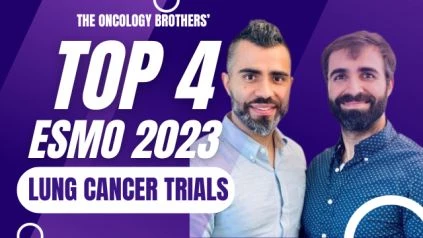Date: 11/07/2023
Courtesy: OncologyBrothers
Drs. Rahul Gosain, MD and Rohit Gosain, MD, referred to as the oncology brothers, reflected on the impressive content presented at ESMO 2023. They segmented the lung cancer highlights into two key studies: KEYNOTE 671 focusing on resectable non-small cell lung cancer and the Alina trial for ALK-positive patients. They were joined by Dr. Joshua Reuss from Georgetown Lombardi Kansas Center.
KEYNOTE 671 Results from ESMO 2023
KEYNOTE 671, a phase 3 study, examined the peroperative IO chemo combination and its impact on overall survival. The results showed an overall survival benefit, demonstrating a hazard ratio of 72 in favor of the IO chemo combination. This benefit was observed across different disease parameters, indicating practice-changing implications. The FDA also approved this regimen for certain patient criteria, marking a significant step in enhancing patient outcomes.
Regarding the selection between CHECKMATE 816 and KEYNOTE 671 for patients, they emphasized the need for additional data, especially focusing on factors like pathologic response, disease stage, and biomarker analysis. This discussion highlighted the complexities of treatment decisions in this evolving landscape.
ALINA trial investigated the role of alectinib
The ALINA trial investigated the role of alectinib in resectable non-small cell lung cancer with ALK-positive mutation, displaying a notable benefit in disease-free survival, particularly in the CNS, which could be groundbreaking for this patient population. The conversation explored the balance between chemotherapy and alectinib in treatment strategies for these patients.
TROPION Lung 01 study, exploring the antibody-drug conjugate
In metastatic non-small cell lung cancer, the discussion covered the TROPION Lung 01 study, exploring the antibody-drug conjugate dat DxD compared to standard treatment. The results revealed a modest progression-free survival advantage, primarily visible in non-adenocarcinoma subgroups. The conversation also touched upon the potential role of dat DxD in patients with actionable mutations who have progressed on upfront TKIs.
The dialogue addressed the need for further investigation and data analysis in these areas. Dr. Reuss highlighted the potential of other compounds, such as patritumab deruxtecan, in the treatment landscape, especially in patients with EGFR mutations, offering more options in this challenging space.
In summary, the discussion reflected on significant advancements in lung cancer treatment, emphasizing the need for additional data to refine treatment choices and further expand the available options for different patient subsets. The exploration of these studies showcased the potential for improving patient outcomes and the ongoing evolution in lung cancer therapy.

